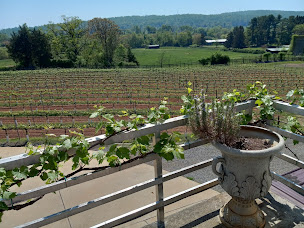Mediterranean Cellars Winery
April 21, 2023. When we visited on an abnormally warm April morning, Mediterranean Cellars Winery was celebrating 62 years of winemaking. While it opened its tasting room outside of Warrenton in Fauquier County in 2003, Mediterranean Cellars has a long lineage of winemaking through its owners, Louis and Katie Papadopoulos. After an apprenticeship with his father and grandfather in Greece, Louis began winemaking on his own in 1961. He came to the States in the mid-1960’s and eventually realized that similarities between the red soil around Warrenton and his native Greece showed the potential for wine. He began planting vines in 1984.
We were sorry to have missed Mr. Papadopoulos on our visit, but we had an engaging chat with long-term employee, Brigitta. Thanks for her hospitality.
The winery sits on a small hill with the tasting room facing east across a patch of vineyard growing white wine grapes. Looked like bud break was just past. Vines wrap their tendrils around the porch. A nice breeze was blowing. Outside the tasting room, there are sunny tables and fountains on terraces. You might feel as if you were sipping Retsina in a taverna gazing across the harbor of Corinth.

The thirty different wines span vintages from 2006 to 2020. Some of those earlier vintages may be past their prime by now.
Pinot Grigio 2013. Very summery and light. Kim rated it a B.
Riesling 2013. Strong aroma of green apple carries to the palate as well. Could have been drier. Kim rated it a B.
Moscato 2014. Medium strong aroma; somewhat sweet even though listed as dry. Overall too strong. Kim rated this one a D.
Cabernet Sauvignon 2006. Color has clear brown aging notes on the ruby. Low tannin. Plummy taste with oak and pepper. There is also a tang that hints that it's beginning to turn. I’d rate this a B but I would have to consider whether this bottle of 2006 Cabernet Sauvignon is really worth the $98.00 asking price.
Cabernet Sauvignon 2008. More ruby and less brown than the 2006, as you’d expect. More noticeable legs and more alcohol taste. Plum and chocolate. Some residual sugar detected. It compares well to the 2006 edition. B
Pinot Noir 2013. Brighter in color and lighter than the Cabernet’s. Less legs. But the residual sugar gives it almost a dessert wine level of sweetness. Not particularly elegant for a Pinot. Our server said that the grapes for the Pinot Noir came from Mediterranean’s sister winery, Molon Lave. More about Molon Lave in a future post. B-
Penteli 2008. One reason we chose to visit Mediterranean was on a recommendation from some friends who loved the Port-styled wine here. Of the four different Port-styled wines available, Penteli was featured on the tasting menu. The color was very dark cola around the edges of the glass. Chocolate aroma. Strong defined legs. Smooth. Good balance. Cherry notes. A-
Rechina 2010. Mediterranean may be the only winery in the United States to make this pine-infused Greek wine, which they call ‘Rechina.” The original term “Retsina” is a protected origin term, like “Port.” Mr. Papadopoulos imported pine and certain grapes, perhaps Savatiano, to make his white Rechina. You can taste the pine light on the front and in the aroma. The wine is not really high in alcohol or residual sugar. It produced some pucker but was not sour. Earthy and a little washed out. B.


.jpg)

Comments
Post a Comment